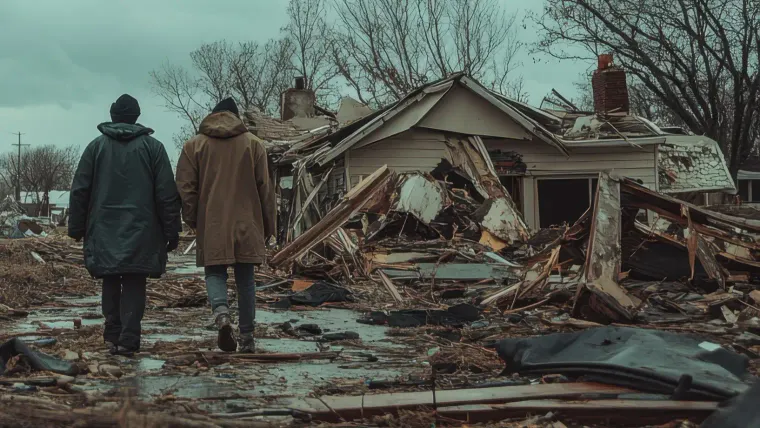One thing that stands out when you skip Job’s speeches and solely read the replies of Eliphaz, Bildad, and Zophar is how disinterested his “friends” are in discussing natural disasters.
Having seen their first replies fail to convince Job to repent, his "friend's" change tactics. In their second replies, all three of them talk for prolonged periods about the fate of the wicked (see 15:20-35, 18:5-21, and 20:4-29). Perhaps they’re trying to scare Job into repenting much like a Christian does when describing someone's fate in hell.
Bildad, in particular, seems to delight in weaving Job’s current trauma into the frightening future of an evil man. He describes how "disaster" (18:12 NIV) waits for the wicked "to stumble" (18:12 NLT) and how disease eats away at parts of his skin (18:13). He mentions how the homes of the wicked will be destroyed by fire and brimstone (18:15), leaving no offspring to remember their name (see 18:17-19).
"People in the west are appalled at their fate;
people in the east are horrified.
They will say, 'This was the home of a wicked person,
the place of one who rejected God.'"
— Bildad in his second speech, Job 18:20-21 NLT
Finally, natural disasters
It takes until the end of Zophar’s second and last speech—the sixth of these replies—for one of them to talk about natural disasters. Considering how the destructive forces of nature caused Job’s suffering, it amazes me how their thinking gets summed up in just the following few verses.
"Their treasures will be thrown into deepest darkness.
A wildfire will devour their goods, consuming all they have left.
The heavens will reveal their guilt,
and the earth will testify against them.
A flood will sweep away their house.
God's anger will descend on them in torrents.
This is the reward that God gives the wicked.
It is the inheritance decreed by God."
— Zophar in his second reply, Job 20:26-29 NLT
Zophar believes God uses natural disasters to expose sin. They are the outworking of his wrath against the wickedness of humans. Therefore, Job’s guilt is not in question, for his evil has been thoroughly exposed by nature’s witness.
He then twists the idea of inheritance being a blessing by saying that such calamities are God's "reward" for a wicked life (20:29).
None of his "friends" encourage Job to repent in their second replies because they are angry at Job for not listening to the wisdom of the tradition they share, which "wise men who have heard the same thing from their fathers" have "confirmed" (Eliphaz in his second reply, 15:18 NLT).
It's a tradition that one of the most prolific Christian authors from the last fifty years continues to popularise.
Every deadly calamity is a merciful call from God for the living to repent.
— John Piper
Tsunami and Repentance, desiringGod.org
Calling victims of natural—or climate—disasters to repent is abusive because, in the words of Rachel Held Evans, "it blames the victim for whatever calamity, abuse, or tragedy she suffers and says it is deserved."
The book of Job challenges the toxic beliefs of deserved punishment and calling victims to repent through carefully establishing Job's innocence within the prologue. This is not the reason he suffers. The natural disasters that caused his pain are not a call for him to repent. We explored this in last week's article, The order of deserved punishment.
But the "friends" express another toxic belief that the theology of deserved punishment tricks us into believing. This is a belief that Protestant theology has long entertained.


